HUBUNGAN FILSAFAT DAN AGAMA MENURUT PANDANGAN IMMANUEL KANT DI ERA MODERN
Abstract
Religions based on the authority of divine revelation and guidance acknowledge the existence of a metaphysical world which often forms the basis of morals and ethics. Meanwhile, philosophy invites humans to consider and understand the world through reason and rationality and to seek truth with logical reasoning. The two have a relationship that cannot be separated and differentiated because they both have their own entities. In this research, we will discuss the relationship between philosophy and religion according to the views of Immanuel Kant, a great philosopher of the 18th century, based on a view of the modern era. This research was designed using qualitative research methods using a literature study approach , namely collecting reference sources from various literature that are appropriate to the discussion and subject of the study. The conclusion of this study is that according to Kant's view, the essence of religion is in line with universal morality and ethical obligations, not with the dogmatic or ritual aspects of religion. Kant encourages a rational and moral understanding of religion, where humans are expected to act in accordance with their moral obligations without relying completely on religious teachings which is the handle. Thus, Immanuel Kant's views on the relationship between religion and philosophy provide a perspective that respects both domains, while encouraging a more rational and moral approach to religious belief.
Keywords
References
Amalia, Siti. “Hakekat Agama Dalam Perspektif Filsafat Perenial†1, no. 1 (2019).
Cooper, Andrew. “Hypotheses in Kant’s Philosophy of Science.†Studies in History and Philosophy of Science 99 (June 2023): 97–105. https://doi.org/10.1016/j.shpsa.2022.04.007.
Dahlan, Muhammad. “Pemikiran Filsafat Moral Immanuel Kant. (Deantologi, Imperatif Kategoris Dan Psotulat Rasio Praktis).†Jurnal Ilmiah Ilmu Ushuluddin 8, no. 1 (2009): 37–38.
Dinata, Syaiful. “EPISTEMOLOGI KRITISISME IMMANUEL KANT,†n.d.
Hamzah, Agus, and Septiana Dwiputri Maharani. “LGBT dalam Perspektif Deotologi Immanuel Kant†4, no. 1 (2021).
Hidayatullah, Syarif. “AGAMA DAN SAINS: SEBUAH KAJIAN TENTANG RELASI DAN METODOLOGI,†n.d.
Ihsan, Nur Hadi, Khasib Amrullah, Usmanul Khakim, and Hadi Fatkhurrizka. “Hubungan Agama dan Sains: Telaah Kritis Sejarah Filsafat Sains Islam dan Modern.†Intizar 27, no. 2 (November 30, 2021): 97–111. https://doi.org/10.19109/intizar.v27i2.9527.
Kant, Immanuel. Agama Dalam Batasan Nalar. 5th ed., 1999.
Moqaddam, S., Almasi, and S Qamsar. “Tinjauan Teori Immanuel Kant: Membedakan Ranah Agama Dan Sains.†Jurnal Ilmu Sosial Mediterania 6 (2015).
Mujahidin, Anwar. “Epistemologi Islam : Kedudukan Wahyu Sebagai Sumber Ilmu.†Ulumuna Jurnal Studi Keislaman 17, no. 2 (2013).
Oktaviani, DR, and RA Ramadhani. “Hakikat Manusia : Pengetahuan (Pengetahuan), Ilmu (Sains), Filsafat Dan Agama.†Jurnal Tawadhu 5, no. 2 (2021): 143–59.
Saifuddin, Saifuddin. “KAJIAN AGAMA DAN FILSAFAT TENTANG KEBENARAN.†Jurnal Ilmiah Islam Futura 7, no. 2 (April 26, 2018): 73. https://doi.org/10.22373/jiif.v7i2.3066.
Subadi, T. PENELITIAN KUALITATIF. Surakarta: Pers University Muhammadiyah, 2006.
Sugiono. Metode Penelitian Kuantitatif, Kualitatif Dan R&D. Bandung: Alfabet, 2014.
Syarif, Muh. Rasywan. “RATIONAL IDEAS HARUN NASUTION PERSPECTIVE OF ISLAMIC LAW.†Al-Risalah Jurnal Ilmu Syariah dan Hukum 1, no. 1 (June 22, 2021): 10. https://doi.org/10.24252/al-risalah.v1i1.21017.
Yunus, Muhammad. “Anti Metafisika Dalam Epsitemologi Immanuel Kant dan Kemungkinan Agama Sebagai Jalan.†khabar 2, no. 2 (December 30, 2020): 177–89. https://doi.org/10.37092/khabar.v2i2.255.
DOI: 10.28944/reflektika.v18i2.1341
Refbacks
- There are currently no refbacks.


.png)

